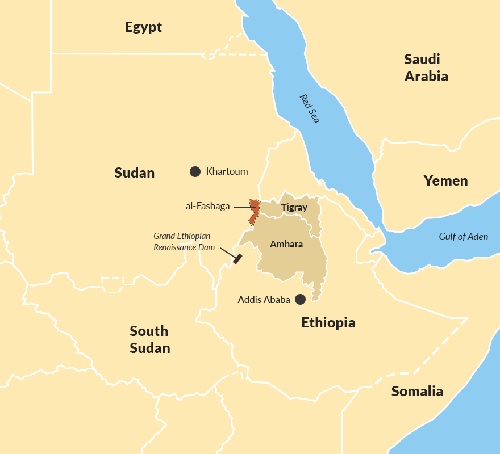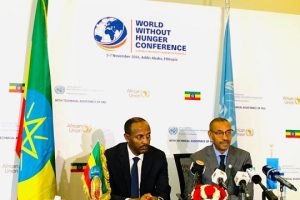
BY YOHANES JEMANEH
When war broke out in northern Ethiopia in November 2020 following the terrorist TPLF’s onslaught against the Ethiopian Defense Forces of Northern Command, the Sudanese military occupied the Ethio-Sudan borderland called Al-Fashaga. The war had served as a blessing in disguise for Khartoum’s opportunist invasion. The fertile land has been a source of agricultural production for several Ethiopian farmers whose livelihoods have been built on growing sesame, maize, and cotton.
The land has been part of Ethiopia until the Sudanese government occupied it in November 2020 unveiling its diplomatic camouflage and began echoing the sound of claiming possession. Since then, Sudan provoked tensions have escalated between the neighboring states on the border. The Al-Fashaga is located between Sudan’s eastern province of Al-Qadarif and the Amhara regional state of Ethiopia.
Though Ethiopia extended an olive branch and tried to resolve the dispute through diplomatic means, the sought-after goal failed to produce meaningful results. In fact, Sudan’s invasion resulted in the displacement of thousands of Ethiopian farmers and the obstruction of livelihoods apart from creating a rift between both countries.
Sudan’s invasion has been nothing less than an irresponsible act to Ethiopia’s responsible role in Sudan’s internal politics. Ethiopia has been a notable peacemaker in the Sudan conflict and transition. Diplomats from Ethiopia have been shuttling from Addis to Khartoum to broker a peace deal between Sudan’s conflicting factions. However, the occupation triggered a mistrust and diplomatic row even if the good people of Sudan still recognize longstanding Ethiopia’s role in extending a helping hand during their rainy season. From deploying a peacekeeping mission to facilitating diplomatic solutions, Ethiopia indeed has been a reliable partner in Sudan’s quest for development and democracy. But dejectedly, Sudan has been digging its heel into its violent approach in the face of international silence.
Even worse, the Sudanese government has been colluding with Ethiopia’s internal and external adversaries to destabilize Ethiopia. Some Sudanese military officials and politicians have been using the border issue as first aid to quell public grievances.
Lately, the Ministry of Foreign Affairs (MoFA) lambasted the deaf ear turned by the international community to the invasion citing it as part of the global pressure on Ethiopia. It is obvious that the borderland that Sudan occupied has been part of Ethiopia for many years and the two countries agreed in the 1960s on the cooperation framework the issue should be entertained, the ministry added.
The agreement has helped the nations to solve some discords but some unresolved issues morphed into the current invasion. But the war in Ethiopia emboldened Sudan to occupy the land. Perplexingly, no country was able to denounce this invasion, said Deputy Prime Minister and MoFA Minister Demeke Mekonnen.
“A clear invasion has taken place, but Ethiopia’s position has been settling the issue through a peaceful means. We do not want to use war as an option. We have been consistently expressing this to the international community including the UN and AU. We still have hopes that these bodies will pressure Sudan to follow Ethiopia’s suit,” Demeke said.
The border dispute must be solved peacefully as a domino effect not only on the peace and security of the two countries but also on the entire region since both countries share a huge population in the area.
As explained by some geopolitical analysts, Sudan has been exploiting geopolitical shifts in Ethiopia to its own internal strength and makes incursions in the area. And the border dispute, therefore, has become an indicator of the relative strength of one compared to the other, and the nature of their relationship, a report published by the International Crisis Group in June 2021 indicated. That is exactly what Sudan made in November 2020 as it exploited the Tigray conflict to immediately occupy the Al-Fashaga area that it has been craving for years.
Improving internal strength is important for Ethiopia to solve the border dispute through every option. In this regard, addressing local conflict and ensuring rule of law, achieving national consensus on major national issues using the national dialogue as a tool is to secure Ethiopia’s national interests in the region and sovereignty. This approach is also a key measure to settling the dispute with Sudan and other neighboring countries. Building internal strength transforms the country’s capacity to positively influence its diplomatic relations with Sudan and the rest of the world. Ensuring local peace and unity consolidates Ethiopia’s diplomatic pressure to solve border disputes, Demeke said.
To seek a win-win solution and resolve border issues is one thing, but to invade and displace Ethiopian farmers is another thing if not a sinister act.
Except for the 1902 border agreement, the Ethiopia and Sudan boundaries were never clearly demarcated. The beginnings of the Al-Fashaga dispute go back to the 1902 Anglo-Ethiopian Treaty– a colonial-era document that sought to determine the frontier between Ethiopia and Sudan under British dominion.
The treaty, which was the result of protracted negotiations between Emperor Menelik II and the British government, assigned the territory that is now the border region of Benishangul-Gumuz to Ethiopia and addressed the flow of Blue Nile waters from Ethiopia’s Lake Tana. Ethiopian claims to Al-Fashaga extend 40-50km west of a line delineating the border between Sudan and Ethiopia, defined only in general terms by the treaty and loosely demarcated by the British, ICG reported.
Following the 1972 visit by Ethiopian Emperor Haile Selassie to Sudan as part of his mediation of Sudan’s north-south conflict, the two countries sought to resolve the boundary dispute with an exchange of notes that would guide demarcation. However, the 1974 revolution in Ethiopia disrupted this effort.
In 2007, the late Prime Minister Meles Zenawi and former President Omar Al-Bashir agreed on a cooperation framework in which Ethiopian and Sudanese citizens could both cultivate the land, with the two sides agreeing to undertake formal demarcation at an unspecified later date.
Sudan’s incursion of the borderline in 2020 is a stark departure from the previous path defined by strong comradely and close ties. Sudan’s Al-Fashaga claim and its call for demarcation of the occupied area is open aggression against Ethiopia’s rights. Ethiopia expects Sudan to withdraw from the area it has occupied. The international community needs to denounce the invasion of Sudan and put pressure to evacuate the land it occupied from Ethiopia thereby peaceful negotiation would be started.
On the way forward considering ICG’s suggestion is worthwhile. ICG recommends the countries find a lasting solution to the border dispute by demarcating the boundary through the Joint Border Committee of the two neighboring nations. The African Union Border Programme could help in this regard through facilitating support.
Ethiopia and Sudan have strong historic and cultural relations supporting each other in trying times. The two neighboring peoples have developed a culture of tolerance and coexistence. They will continue this amicable relationship if the Sudanese government tends to smooth its stubbornness in retaining Al-Fashaga through military power and prioritize diplomatic means.
The Ethiopian Herald Mat 31/2022




